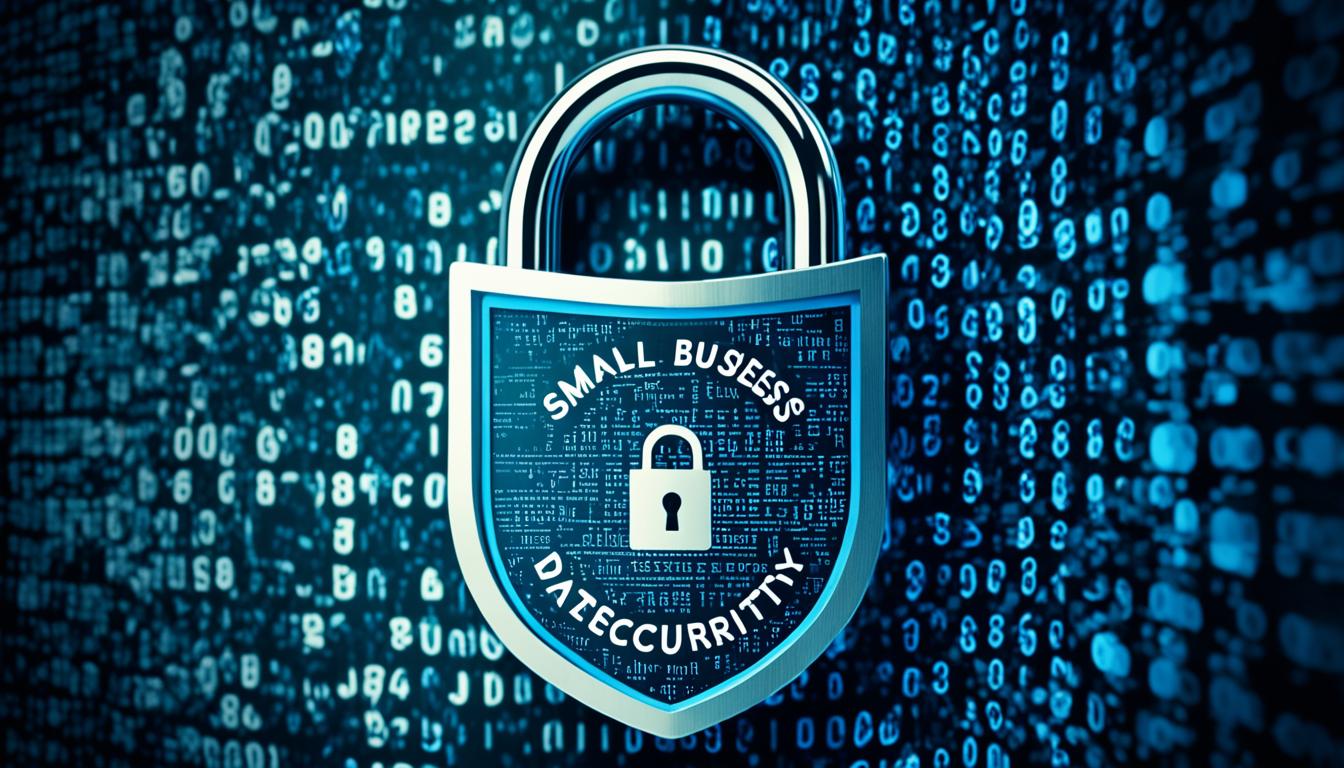Cybersecurity is a crucial aspect of running a small business in today’s digital landscape. With the increasing prevalence of cyber threats, protecting your business from potential attacks is essential to ensure the safety of your data, financial information, and customer privacy.
Small businesses are often targeted by cybercriminals due to perceived weaker defenses compared to larger organizations. Implementing cybersecurity measures can help prevent common attacks such as ransomware, data breaches, and phishing scams. By investing in employee training, regular risk assessments, antivirus software, software updates, data backups, encryption, and strong password policies, small businesses can effectively protect themselves from cyber threats.
Key Takeaways:
- Small businesses need to prioritize cybersecurity to protect their data and operations.
- Implement essential cybersecurity measures, such as employee training and regular risk assessments.
- Invest in antivirus software, software updates, data backups, encryption, and strong password policies.
- Overcome common misconceptions about small business cybersecurity.
- Foster a culture of security awareness within your organization.
The Importance of Small Business Cybersecurity
Cyber threats pose a significant risk to small businesses, potentially resulting in financial losses, operational disruptions, and reputational damage. Small businesses often handle sensitive data, including customer information, pricing structures, and intellectual property, making them attractive targets for cybercriminals. A single cyberattack can lead to severe consequences such as the loss of customer trust, legal liabilities, and even business closure. Therefore, prioritizing cybersecurity is crucial to ensuring the security and continuity of small business operations.
Small businesses must understand the gravity of cyber threats and take proactive measures to protect their data, systems, and online presence. By investing in robust cybersecurity practices, small businesses can mitigate the risks associated with cyber threats, safeguard their intellectual property, and maintain the trust of their customers.
One of the most prevalent cyber threats faced by small businesses is ransomware, a malicious software that encrypts valuable data and demands a ransom for its release. Phishing scams, on the other hand, trick individuals into revealing sensitive information, such as login credentials, through deceptive emails or websites. These examples demonstrate the diversity and sophistication of cyber threats, highlighting the need for small businesses to remain vigilant and well-prepared.
The Scope of Data Protection and Online Security
Data protection is a critical component of small business cybersecurity. It encompasses various practices aimed at securing sensitive information from unauthorized access or disclosure. Implementing robust data protection measures, such as encryption and secure storage solutions, is crucial to prevent data breaches and maintain the confidentiality of customer data.
Online security encompasses all measures taken to protect small businesses from cyber threats in the digital realm. This includes implementing strong firewalls, regularly updating software and systems, and using secure communication channels. Taking proactive steps to safeguard online security helps prevent unauthorized access to systems and ensures the integrity of small business operations.
Protecting Intellectual Property
Small businesses often rely on intellectual property to differentiate themselves in the market and maintain a competitive edge. Protecting intellectual property from cyber threats is of utmost importance to preserve business viability and reputation. Implementing measures such as data encryption, access controls, and regular backups can help safeguard intellectual property from unauthorized access or theft.
Furthermore, small businesses must establish clear policies regarding the protection of intellectual property and educate employees on their role in safeguarding this valuable asset. By fostering a culture of intellectual property protection, small businesses can minimize the risk of IP-related cyber threats.
Quote:
“The rise of cyber threats underscores the importance of small business cybersecurity. By prioritizing data protection, online security, and safeguarding intellectual property, small businesses can mitigate the risks associated with cyber threats and ensure their long-term success.” – [Author’s Name]

| Cyber Threat | Description |
|---|---|
| Ransomware | A type of malware that encrypts valuable data and demands a ransom for its release. |
| Phishing Scams | Deceptive techniques used to trick individuals into revealing sensitive information, such as login credentials. |
| Data Breaches | Unauthorized access or disclosure of sensitive information, compromising customer privacy. |
Essential Cybersecurity Measures for Small Businesses
To protect your small business from cyber threats, implementing essential cybersecurity measures is crucial. By prioritizing the security of your data and systems, you can mitigate the risks associated with cyberattacks. Here are some key measures that every small business should implement:
1. Employee Training
One of the most critical aspects of cybersecurity is ensuring that your employees are well-trained and aware of potential threats. Human error and negligence can open the door to cyberattacks. Conduct regular training sessions to educate your employees about phishing scams, social engineering, password security, and other common attack vectors.
2. Risk Assessment
Performing regular risk assessments is crucial for identifying vulnerabilities in your systems and processes. This assessment helps you understand the potential impact of a cyberattack and design a comprehensive security strategy. Consider conducting both internal and external assessments to ensure a thorough evaluation of your small business’s security posture.
3. Antivirus Software
Installing reliable antivirus software is essential to protect your small business from malware and other security threats. It provides real-time scanning and removes malicious software that can compromise your systems. Ensure that the antivirus software is regularly updated to stay protected against the latest threats.
4. Software Updates
Keeping all your software and applications up-to-date is crucial for maintaining a secure environment. Updates often include patches that address security vulnerabilities and weaknesses, strengthening your defense against potential attacks. Regularly check for updates and apply them promptly to stay protected.
5. Data Backups
Regularly backing up your data is crucial for ensuring its availability and integrity in the event of a cyberattack or system failure. Implement a comprehensive data backup strategy that involves regular automated backups to multiple locations, including offsite or cloud storage. This reduces the impact of data loss and enables quick recovery.
6. Encryption
Encrypting sensitive data is an effective way to protect it from unauthorized access. By implementing encryption measures, you ensure that even if data is intercepted or stolen, it remains unreadable and unusable to the attackers. Utilize encryption for data both at rest and in transit, such as through secure protocols and SSL/TLS certificates.
7. Strong Password Policies
Implementing strong password policies is crucial for preventing unauthorized access to sensitive information. Encourage employees to use unique, complex passwords and change them regularly. Consider implementing multi-factor authentication (MFA) to add an extra layer of security.
By implementing these essential cybersecurity measures, small businesses can greatly enhance their protection against cyber threats. Remember, cybersecurity should be an ongoing effort that adapts to evolving threats and incorporates the collective responsibility of everyone in your organization.
Overcoming Common Small Business Cybersecurity Misconceptions
It is important to address several common misconceptions surrounding small business cybersecurity. Despite the belief that they are not a target for cybercriminals, every small business is susceptible to cyberattacks. Cybersecurity is not solely a technology issue; it involves the people and processes within the organization as well. Many small business owners assume that cybersecurity requires a significant financial investment. However, cost-effective solutions are available to protect your business from cyber threats.
Another misconception is that cybersecurity is a one-time project. In reality, it should be an ongoing process that adapts to the ever-evolving threats in the digital landscape. While cybersecurity is often seen as the responsibility of the IT department, it is actually a collective responsibility that extends to every member of the organization. They all play a crucial role in maintaining a secure environment.
“Cybersecurity is not just about technology; it is about the people and the processes within the organization.”
Small business owners should also be aware that cybersecurity insurance does not cover all losses resulting from a cyberattack. It is essential to have a comprehensive cybersecurity strategy in place that focuses on both compliance and protection. Compliance alone does not guarantee the safety of your business. Additionally, relying solely on technology for cybersecurity is a misconception. Human behaviors and awareness are equally important in maintaining security.
By overcoming these common misconceptions, small businesses can better understand the importance of cybersecurity and take the necessary steps to protect their valuable assets in the digital age.
The Myths Busted:
- Small businesses are not a target for cybercriminals
- Cybersecurity is solely a technology issue
- Cybersecurity requires a huge financial investment
- Cybersecurity is a one-time project
- Cybersecurity is the sole responsibility of the IT department
- Cybersecurity insurance covers all losses
- Compliance guarantees protection
- Technology alone is enough for cybersecurity
By dispelling these myths, small businesses can adopt a proactive and informed approach to cybersecurity, minimizing the risk of cyber threats and ensuring the safety of their operations.

The Reality of Cybersecurity Insurance:
| Myth | Reality | |
|---|---|---|
| 1 | Cybersecurity insurance covers all losses | Cybersecurity insurance may not cover all losses, and certain conditions and exclusions may apply. |
| 2 | ||
| 3 |
Conclusion
Protecting your small business from cyber threats requires a proactive and comprehensive approach to cybersecurity. By implementing essential cybersecurity measures such as employee training, risk assessment, and strong password policies, small businesses can significantly enhance their protection against cyberattacks.
It is crucial for small business owners to prioritize cybersecurity and invest in the necessary resources to safeguard their data, operations, and customer trust. By staying informed about emerging threats and continuously updating security measures, small businesses can stay one step ahead of cybercriminals.
Remember, cyber threats are a reality for all businesses, regardless of their size. By overcoming common misconceptions and fostering a culture of security awareness, small businesses can create a strong defense against cybercriminals, ensuring the longevity and success of their business.
FAQ
Why is cybersecurity important for small businesses?
Cybersecurity is important for small businesses to protect their data, financial information, and customer privacy from cyber threats such as ransomware, data breaches, and phishing scams. It also helps maintain the trust of customers and prevents financial losses and reputational damage.
What are some essential cybersecurity measures for small businesses?
Essential cybersecurity measures for small businesses include employee training, conducting risk assessments, installing antivirus software, keeping software updated, regularly backing up data, encrypting sensitive information, and implementing strong password policies.
What are some common misconceptions about small business cybersecurity?
Common misconceptions about small business cybersecurity include the belief that they are not a target for cybercriminals, that cybersecurity is solely a technology issue, that it requires a significant financial investment, and that it is a one-time project. It is also a misconception that cybersecurity is the sole responsibility of the IT department and that technology alone can provide sufficient protection.
Do cybersecurity insurance and compliance guarantee full protection?
No, cybersecurity insurance does not cover all losses from a cyberattack, and compliance with regulations does not guarantee complete protection. It is important to implement comprehensive cybersecurity measures and maintain ongoing security awareness.
How can small businesses enhance their protection against cyber threats?
Small businesses can enhance their protection against cyber threats by prioritizing cybersecurity, staying informed about emerging threats, continuously updating security measures, and fostering a culture of security awareness among all employees.








